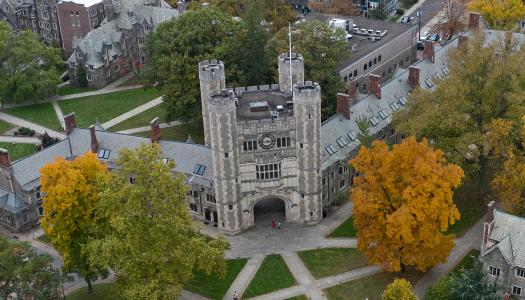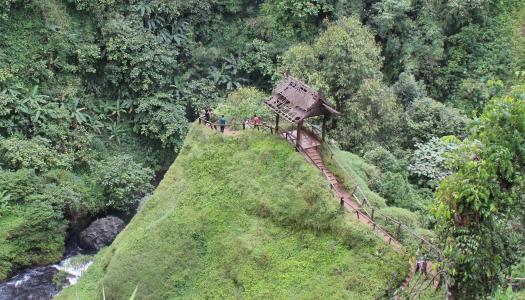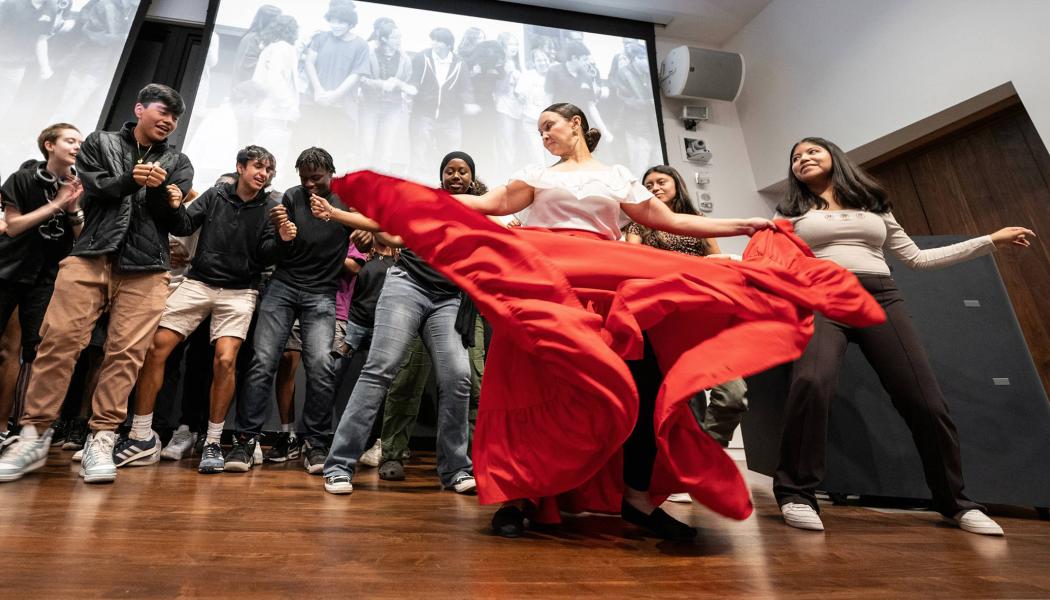
As part of their cultural study, Princeton University Preparatory Program scholars learn about traditional Puerto Rican plena and bomba with dance and musical artists from Philadelphia’s Puerto Rican Institute of Music. (Photo by Tori Repp)
Princeton summer programs prepare first-gen and low-income students for success in college and beyond
Over 360 first-generation college and lower-income (FLi) students from across the state, the country and the world benefited from four programs hosted this summer by Princeton’s Emma Bloomberg Center for Access and Opportunity.
The distinct programs — Freshman Scholars Institute, Princeton University Preparatory Program, Princeton Summer Journalism Program, and Aspiring Scholars and Professionals — are linked by the Bloomberg Center’s mission to support FLi students to, through and beyond college. Participants include high school students, students from two- and four-year colleges and universities in New Jersey, and incoming Princeton first-years and transfer students.
“The center’s overarching goal is in our name: access and opportunity,” said Khristina Gonzalez, senior associate dean of the college and the Bob Peck ’88 Director of the Emma Bloomberg Center for Access and Opportunity. “We are always thinking about new ways to provide mentorship, guidance and resources to help students achieve their academic, professional and personal goals.”
FSI, PUPP and PSJP are long-standing programs that have evolved and grown over time, while ASAP was launched in 2021. Each has its own components that extend beyond the summer to offer support and mentorship to students as they continue through high school and college.
Some highlights from this summer’s sessions follow.
FSI Residential and FSI Online
Freshman Scholars Institute (FSI) is the University’s long-running pre-orientation program that allows a group of incoming Princeton students to experience academic, co-curricular and social life prior to the start of the fall semester. An online version and expanded residential program in recent years have provided opportunities for additional students. This summer 80 first-years attended FSI on campus, and 160 participated in the separate virtual program.
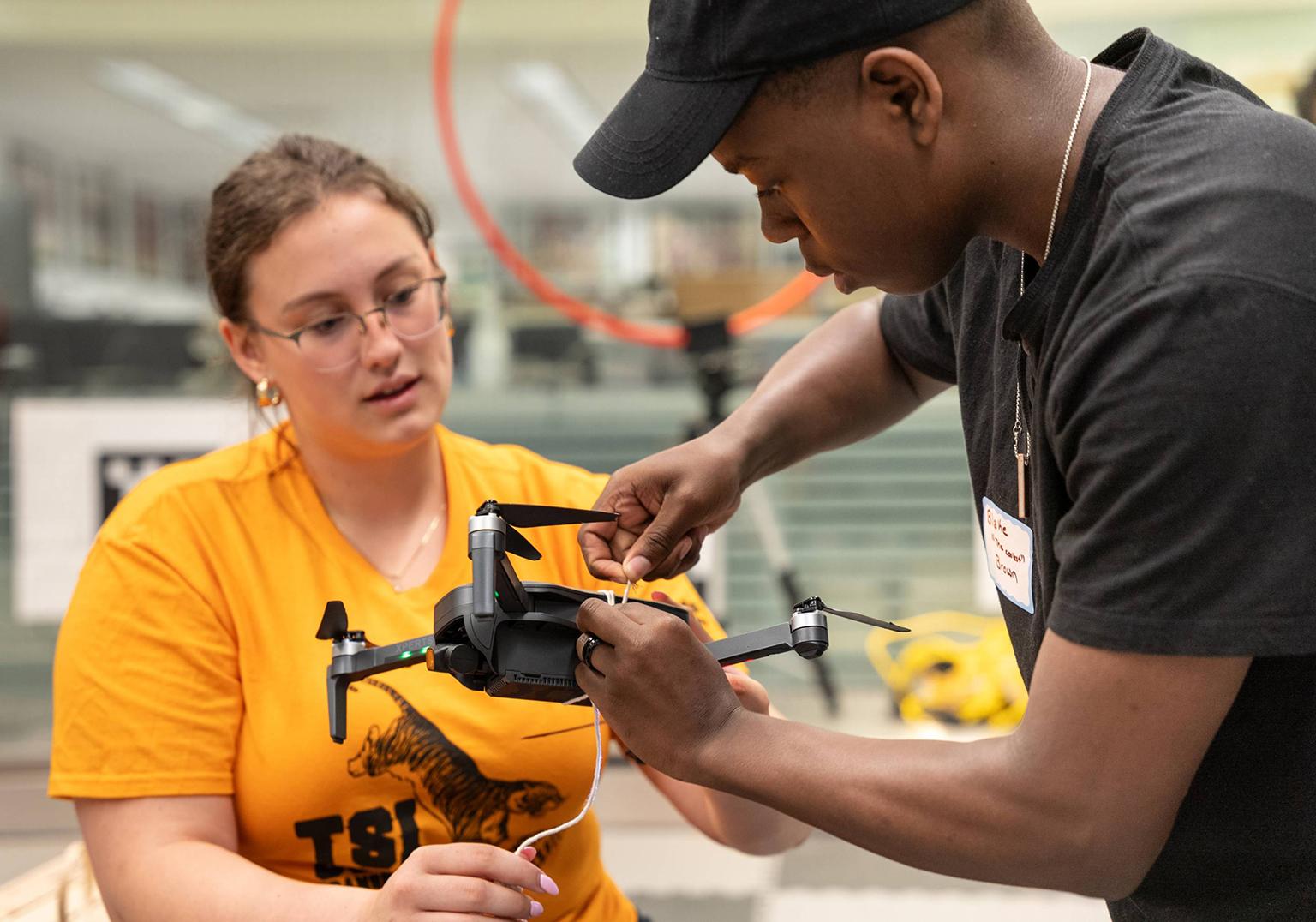
Whether in person or online, FSI students took one or two classes for credit, learned from Princeton faculty, received guidance from staff and peer mentors, became familiar with the many academic and well-being resources that support Princeton students, and built community and friendships.
“We really want to give them a sense of what Princeton is like, have them reflect on their values and their goals, and learn about the different resources that are available so they can pursue their dreams and take their place as leaders on our campus,” Gonzalez said.
The Princeton classroom may be quite different from what students experienced in high school, and FSI helps smooth their transition to the rigor of college, added Gonzalez.
“FSI is able to give them a sense of what the academic curriculum is going to be like,” she said. “The idea of FSI is for students to develop their scholarly voice and do hands-on intensive work.”
One Friday in August in a lab taught by Claire Gmachl, the Eugene Higgins Professor of Electrical Engineering, teams collaborated to design and 3D print a small hook that could attach to a drone and “rescue” a stuffed animal stranded on a “mountain” of wooden crates. The students tried to gently lift one crate without toppling the entire structure and without pulling down the drone.
Natalia Kiernia, a member of the Class of 2027 from the Chicago area, had never used a 3D printer nor the coding program MATLAB before taking the class.
“FSI makes me feel much more prepared for the fall semester. This is a good gradual pathway,” Kiernia said. “I’ve already made friends. I’ve already connected with staff at the Bloomberg Center. I’ve learned to reach out to my professors if I need help, or how to go to their office hours. It has set me up with a lot of skills that I needed to work on. With all my classes in the fall, I probably would have felt overwhelmed without FSI.”
For incoming first-years not on campus, FSI Online aims to replicate the academic, co-curricular and social experiences through a robust, six-week virtual program. The online program also gives students more flexibility, allowing them to have part-time summer jobs or take care of responsibilities at home.
Students use platforms like Zoom and Discord to take the “Ways of Knowing” course, attend workshops with leaders from the Writing Center, McGraw Center for Teaching and Learning and others, and meet in small groups or one-on-one with staff and peer advisers.
“I have never felt myself growing through a class as much as I did with ‘Ways of Knowing,’” said Class of 2027 member Tatyana Wabwire of Nairobi, Kenya. “I feel more like a scholar now than I did six weeks ago.”
This year, FSI Online students arrived on campus a week early to build on their connections and share their final projects in person before the academic year.
“At its core, FSI Online is about building a sense of community among the incoming FLI students, and we do our best to support that community,” said Chelsie Berg-Geist, co-curricular coordinator of the Freshman Scholars Institute. “Our goal is to help the FSI Online scholars become well-rounded students who can strive to balance the academic pressures of Princeton while still making time for themselves, their friendships and their interests outside of academia.”
Princeton Summer Journalism Program
Back for its 22nd summer, the Princeton Summer Journalism Program (PSJP) brought 39 high school juniors from low-income backgrounds to Princeton’s campus to explore the power of journalism as a tool for citizenry and to gain valuable preparation for college as they enter their senior year.
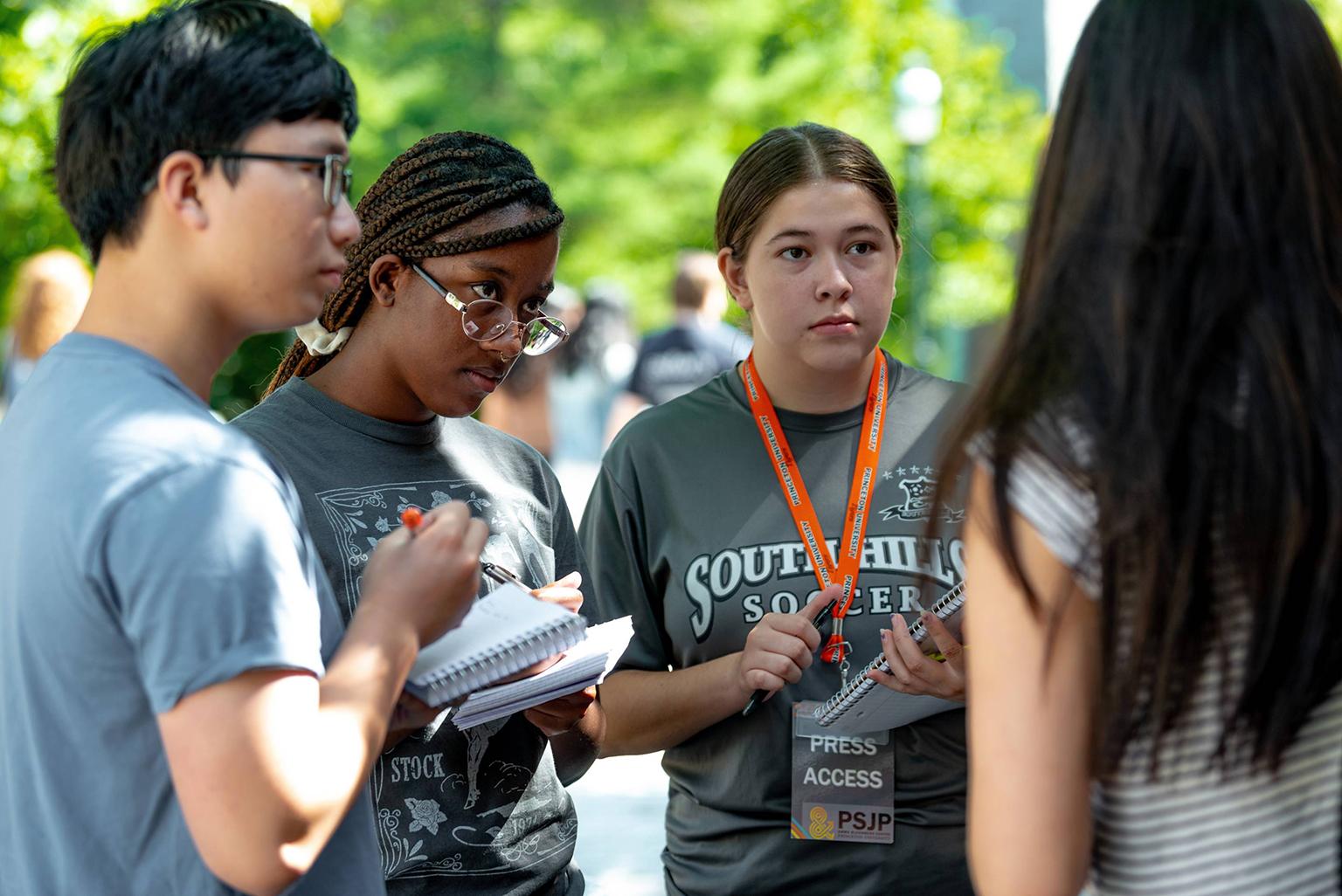
This year marked the first time the program’s students have been on campus since before the COVID-19 pandemic, and the first time PSJP has been offered in a hybrid format.
For weeks before their arrival, the students convened online to build community and learn the basics needed to make the most of their in-person experience. They then traveled to Princeton for 10 days filled with one-on-one mentoring, lectures with professional journalists and Princeton faculty, and hands-on reporting that allowed them to consider how a journalist’s tools can serve them as scholars and citizens.
“We’ve come to think of the program as using journalism as an entrée to the world of ideas and the world of college and liberal arts in education,” said PSJP co-founder Richard Just, Class of 2001. “It turns out to be an amazing entrée into that world because it’s all about reporting and thinking and writing and logic and reason, and being curious and open to learning.”
Of the 613 students who have participated, some have gone on to become journalists, but mostly they are having an impact through all kinds of institutions that shape our country and democracy, Just said. Students also receive college, internship and career support through this broad network of PSJP alumni during the summer and through the school year.
The hybrid format allowed students to do reporting in their own communities before arriving in Princeton, where they worked together this summer to investigate the availability of public bathrooms. All of their reported stories are compiled in the Princeton Summer Journal, which is published annually.
Raylan Li of New York City said PSJP helped him build communication skills that will serve him socially and academically. “I feel like now I’m more confident in my ability to talk to people,” said Li, who is interested in studying politics and environmental science and has previously done political canvassing. “I understand that journalism is a way to make information that might seem a little incomprehensible to the average person more accessible, and also, to bring awareness to really pressing issues.”
Hanny Alvarez of Lawrenceville, Georgia, said she appreciated the community created through PSJP, especially her bonds with the program’s participants — who came from 14 states — and its 16 alumni counselors. As the first in her family who will attend a four-year college, she is grateful for the mentorship and support she will receive through the application process, she said.
“The college counselor they gave me is majoring in biology, and I am also interested in medicine,” Alvarez said. “She’s going to read my essays, my personal statements, my supplements. That’s going to help me tremendously.”
Tieisha Tift, who leads PSJP in her role as assistant director for college preparation initiatives at the Bloomberg Center, said of the 2022 program participants, two are now attending Princeton. Others were admitted to Harvard, Brown, Stanford, Boston University, Syracuse University, Rutgers, and other private institutions and flagship state schools.
Princeton University Preparatory Program
Now in its 23rd year, the Princeton University Preparatory Program (PUPP) welcomed 72 low-income, high-achieving local students to Princeton’s campus this summer for comprehensive college prep designed to help them reach selective colleges and to excel in their studies.
The students participated in a range of activities — from math and science classes to literary performances to cultural exhibitions — during PUPP’s intensive, six-and-a-half-week summer institute. They also visited colleges in several states, including Haverford and Swarthmore colleges in Pennsylvania and Seton Hall University and Ramapo College in New Jersey.
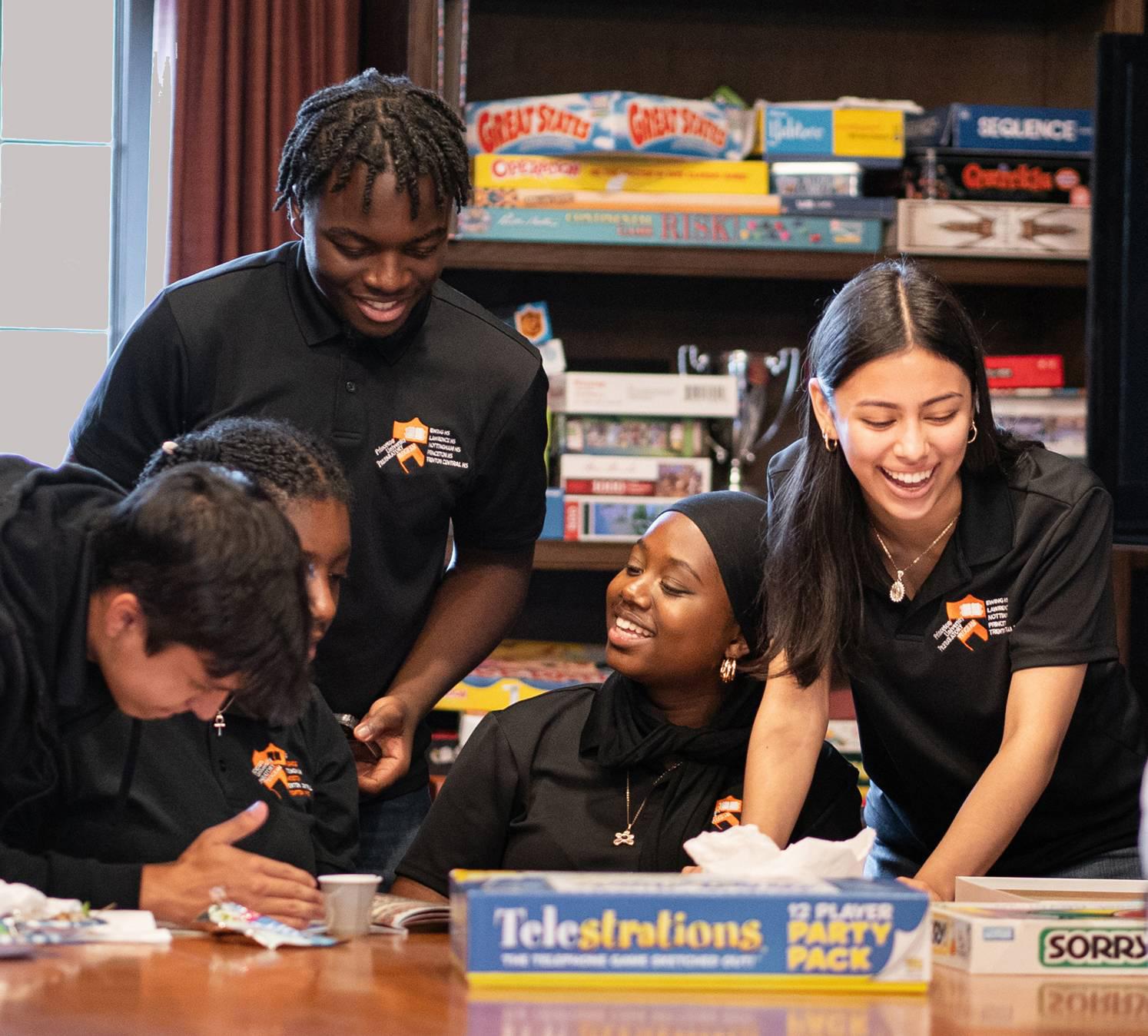
PUPP scholars are chosen through a competitive admissions process during ninth grade, and they participate in the program through high school graduation and their transition to college. Many of the students — who are from Ewing, Hamilton, Lawrence Township, Princeton and Trenton — are the first in their families to attend college.
The tuition-free program supports students throughout the year through weekly after-school academic enrichment sessions and a series of cultural excursions.
O’glenn Togar of Ewing, a senior, said summer days spent at PUPP are “hectic, but fun.” Overall, the program helped to boost his math skills, he said, especially early on when he realized he needed more rigorous and advanced instruction to catch up with his peers. “It’s not like the math is hard,” he said. “But if you’re not exposed to it, you’re not going to know it at all.”
Togar said his participation in PUPP helped to boost his ACT score, as well, improving his chances of attending a top college. He plans to apply to Duke University and the University of Richmond this fall for computer engineering.
William Ovalle of Trenton, a senior, said the program has been especially helpful in building his math, writing and leadership skills. He plans to apply to colleges this fall as a finance or computer science major.
“I appreciate PUPP,” he said. “They’ve done a lot for me. I feel like I wouldn’t be as ready for college. PUPP helps you in so many ways.”
Most PUPP alumni graduate in the top 10% of their high school class and have over an 80% graduation rate at a wide range of selective colleges and universities around the country. The graduation rate is above average for students overall and dramatically higher than the average for students from similar low-income, first-generation backgrounds.
Jason Klugman, PUPP director, said he hopes that by the end of the program, the students see themselves, above all, as scholars. “I hope that they see futures for themselves beyond what they’re currently imagining — that they start to imagine new things for what is possible,” he said.
Aspiring Scholars and Professionals
Launched in 2021, Aspiring Scholars and Professionals (ASAP) is designed to introduce undergraduates from colleges and universities in New Jersey to academic and professional careers in higher education.
“The program is focused on encouraging students to consider careers in higher education more broadly, not just the professoriate. There is so much possibility for students to think about how they can apply their skills and interests,” said Afia Ofori-Mensa, director of Postgraduate Pathways at the Emma Bloomberg Center.
Over nine weeks this summer, 14 undergraduates from local New Jersey institutions were paired with faculty and staff mentors at Princeton to complete internships at academic centers, departments and offices. Internship hosts ranged from the Princeton University Press and the Office of the Dean for Research to the Princeton University Library and the Princeton Institute for International and Regional Studies (PIIRS).
“My favorite part has inarguably been the ability to work within an archive for the first time,” said Stephanie Martínez, a member of the Class of 2025 at the College of New Jersey (TCNJ), who interned at the University library.

Students in ASAP had the option to commute or live on campus, spending part of each day at their internship, along with workshops, wellness activities, regular meetings with their mentors, and weekly career conversations where Princeton faculty and staff candidly shared how they got to where they are today. “The students are really moved by hearing the stories of a real person and learning that your career after college is not always a linear path, and that is OK,” Ofori-Mensa said.
As the culmination, each student gave a 15-minute oral presentation on their internship project and how they may apply what they learned to their studies going forward. Many students said they hope to go on to graduate school after completing their undergraduate degrees.
“My summer experience has both confirmed and reoriented my academic plans,” said Jessica Parmar, a member of the Class of 2025 at TCNJ. Parmar interned with the PIIRS Global Systemic Risk research community and said, “Not only did I learn so much about global agriculture systems, but I was also able to learn how to thoroughly research primary and secondary sources while being able to cite sources properly.”
The ASAP students were also able to connect with Princeton undergraduates in the Mellon Mays Undergraduate Fellowship who remained on campus this summer for their own research projects. MMUF is a national program, led at Princeton through the Bloomberg Center, designed to encourage undergraduates to earn doctoral degrees, ultimately diversifying faculty at colleges and universities across the country.
Now that the summer is complete, students will receive support from the program in connecting with faculty and staff members at their home institutions to further their research and internship experiences during the academic year.
This story originally appeared on the Princeton University website.
